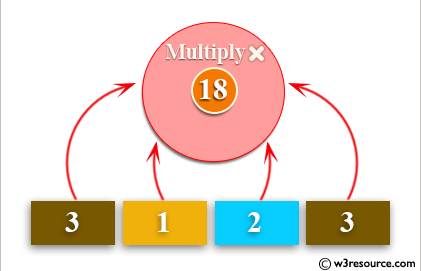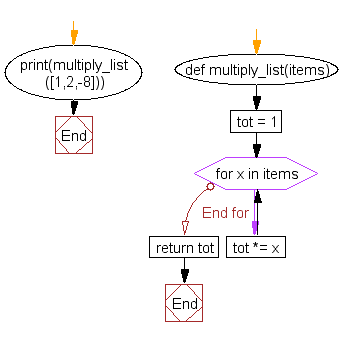Python: Multiply all the items in a list
Multiply Items in List
Write a Python program to multiply all the items in a list.
Visual Presentation:

Sample Solution:
Python Code:
# Define a function called multiply_list that takes a list 'items' as input
def multiply_list(items):
# Initialize a variable 'tot' to store the product of the numbers, starting with 1
tot = 1
# Iterate through each element 'x' in the input list 'items'
for x in items:
# Multiply the current element 'x' with the 'tot' variable
tot *= x
# Return the final product of the numbers
return tot
# Call the multiply_list function with the list [1, 2, -8] as input and print the result
print(multiply_list([1, 2, -8]))
Sample Output:
-16
Explanation:
In the above exercise -
def multiply_list(items): -> This line defines a function called “multiply_list” that takes a single argument items. This function will be used to calculate the product of all the numbers in the items list.
- tot = 1 -> This line initializes a variable called tot to 1. This will be used to keep track of the running total of the product of the numbers in the list.
- for x in items: -> This line starts a loop that will iterate over each element in the items list, one at a time.
- tot *= x -> This line multiplies the current value of x by the tot variable. This is equivalent to the shorter form tot = tot * x.
- return tot -> This line returns the final value of the tot variable after the loop has finished. This is the product of all the numbers in the items list.
print(multiply_list([1,2,-8])) -> This line calls the multiply_list() function and passes in the list [1,2,-8]. The resulting product is then printed to the console using the print function.
Flowchart:

For more Practice: Solve these Related Problems:
- Write a Python program to find the product of only the odd numbers in a list.
- Write a Python program to multiply all elements in a list except those that are zero.
- Write a Python program to find the product of numbers in a list without using a loop.
- Write a Python program to calculate the cumulative product of elements in a list.
Go to:
Previous: Write a Python program to sum all the items in a list.
Next: Write a Python program to get the largest number from a list.
Python Code Editor:
What is the difficulty level of this exercise?
Test your Programming skills with w3resource's quiz.
